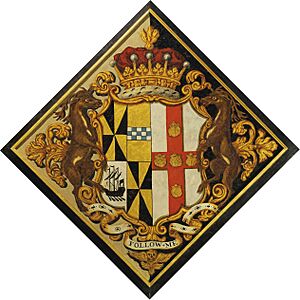John Campbell, 2nd Earl of Breadalbane and Holland facts for kids
John Campbell, 2nd Earl of Breadalbane and Holland (born November 19, 1662 – died February 23, 1752) was an important Scottish nobleman. He was born in Breadalbane to John Campbell, 1st Earl of Breadalbane and Holland and Lady Mary Rich. He inherited his father's titles and responsibilities, becoming a significant figure in Scottish society.
Contents
Family Life and Marriages
John Campbell had two marriages during his lifetime. These marriages were important for his family and social connections.
First Marriage
In 1685, John Campbell married Lady Frances Cavendish. She was the daughter of Henry Cavendish, 2nd Duke of Newcastle-upon-Tyne and Lady Frances Pierrepont. Sadly, Lady Frances passed away on February 4, 1690. They did not have any children together.
Second Marriage
John Campbell married a second time on May 23, 1695. His second wife was Henrietta Villiers. She was the daughter of Edward Villiers and Lady Frances Howard. John and Henrietta had three children. One of their children was John Campbell, 3rd Earl of Breadalbane and Holland, who later inherited his father's titles.
Important Titles and Roles
John Campbell held many important titles and had several key jobs during his life. These roles showed his high standing in Scottish society.
Becoming an Earl
People often called John Campbell by the name Lord Glenorchy before he inherited his main title. On March 19, 1717, he became the 2nd Earl of Breadalbane and Holland after his father passed away. An Earl was a very high-ranking nobleman, often owning large areas of land.
Other Important Titles
Besides being an Earl, John Campbell also held other important titles. These included the 6th Baronet Campbell of Glenorchy. A Baronet was a special title that could be passed down through the family. He was also the 2nd Viscount of Tay and Paintland and the 2nd Lord Glenorchy, Benederaloch, Ormelie and Weick. These titles showed his family's long history and influence.
Public Service Roles
John Campbell also took on several important public service roles. From 1725 to 1752, he served as the Lord-Lieutenant of Perthshire. This meant he was the King's official representative in the area of Perthshire, helping to keep order.
From 1736 to 1747, he was a Representative Peer. This meant he was chosen to represent Scotland's noble families in the British Parliament. This was a very important job, as he spoke for many powerful people.
Later in his life, from 1746 until his death in 1752, he held the office of Chief Justice in Eyre. This was a high legal position, showing his importance in the justice system.
 | Stephanie Wilson |
 | Charles Bolden |
 | Ronald McNair |
 | Frederick D. Gregory |


